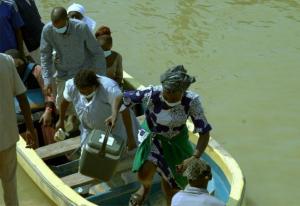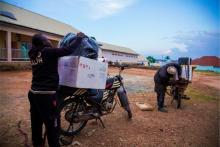Caregivers and health workers brave difficult terrains to vaccinate children in hard-to-reach settlements of Taraba state
Jalingo, 16 December, 2021 - For Ms. Ladi Jika, a 44-year-old housewife and a mother of five, vaccination and mobilization of people to let their children receive the vaccine is not negotiable.
“I know vaccination prevents some diseases such as yellow fever, measles, meningitis and polio. That is why I visit every vaccination site with two of my children (19-month-old and four years old) to get vaccinated. I want to protect my family and I have mobilized my neighbours to receive the vaccines when the vaccinators come around”, Ms. Jika said.
What is more, she resides in difficult Sardauna Local Government Area (LGA), of Taraba State, a largely hilly and remote terrain, in the extreme southeast of Taraba State.
Sitting atop the vast Mambilla Plateau, the LGA also shares international border with the Republic of Cameroon. Many eligible populations there continue to miss their chances at life-saving vaccination, because of high mobility as most frequently traverse in and out of Nigeria. Additionally, transportation to the region is precarious due to the bad roads, rocky terrains and rivers that connect many settlements in the LGA.
The National Primary Health Care Development Agency (NPHCDA) and the Taraba State government in collaboration with WHO and partners, recently implemented a Supplementary Immunization Activities (SIAs) with intensified efforts to reach eligible children in hard to reach and security compromised areas.
“We take vaccines to the security compromised, hard-to-reach area and border settlements in Taraba and the Cameroon borders using the canoes, motorcycles, and sometimes we walk in hilly places”, says Abdullahi Yaji, the Local Government Immunization Officer, in Gembu, the administrative capital of Sardauna LGA.
In Sardauna, vaccinators going to settlements like Mayo Ndaga, Warwar, Kaurmi, Mbamnga and Ndumyaji, board four canoes to get life-saving vaccines to the location.
Meanwhile, Sardauna LGA is not the only LGA in the state bordering Cameroon and with rocky hard to reach or security compromised areas. Taraba state has 16 LGAs, and five - Gashaka, Sardauna, Kurmi, Takum and Ussa- share boundaries with Cameron.
In Gashaka, the focal person for health, Hosea Ezekiel, said there is also a focus on reaching the nomadic pastoralist and people living in the hard to reach areas beyond the hills.
“With intensified commitment and vaccination activities, we would cover most of the under-immunized and hard-to-reach population. I'm going to Gumti, a remote hilly settlement. It takes 2 hours 30 minutes to get there using a motorcycle. I will be going to other villages like Mai Danu, bordering Cameroon, because people traverse in and out of Nigeria from those areas”.
“We are targeting people in the hard to reach area who were never vaccinated, and most of them live in those remote areas. We are working with the Fulani heads to locate new nomads who might have recently moved to the LGA for vaccination”, he said
Vaccinating children and adults who live at the borders of settlements and the nomads is crucial to sustaining the community immunity against vaccine preventable diseases.
“Reaching children in the hard-to-reach areas, border settlements, and security compromised parts of the state with life-saving vaccines is one of our priorities”, WHO State Coordinator (SC), Faruk Umar said as the state implemented a 10-day SIA campaign.
“We understand that some of these areas require days and unconventional means of accessing the people, so we factor all the challenges into the planning of the campaigns”, he said.
To ensure quality campaign, over 1 1200 vaccination teams were trained and engaged to vaccinate the targeted population, especially in hard-to-reach communities in Taraba State.
In Nigeria, the 2021 integrated SIAs is being implemented with a focus to improve vaccination opportunities to areas with high population of Zero dose children (who never received any vaccination) and those who missed opportunities to be vaccinated previously.
Technical contacts:
Dr Jean Anne Baptiste; Email: jeana [at] who.int (jeana[at]who[dot]int)
Dr Ismail, Farouk Umar <ismailfa [at] who.int (ismailfa[at]who[dot]int)>




